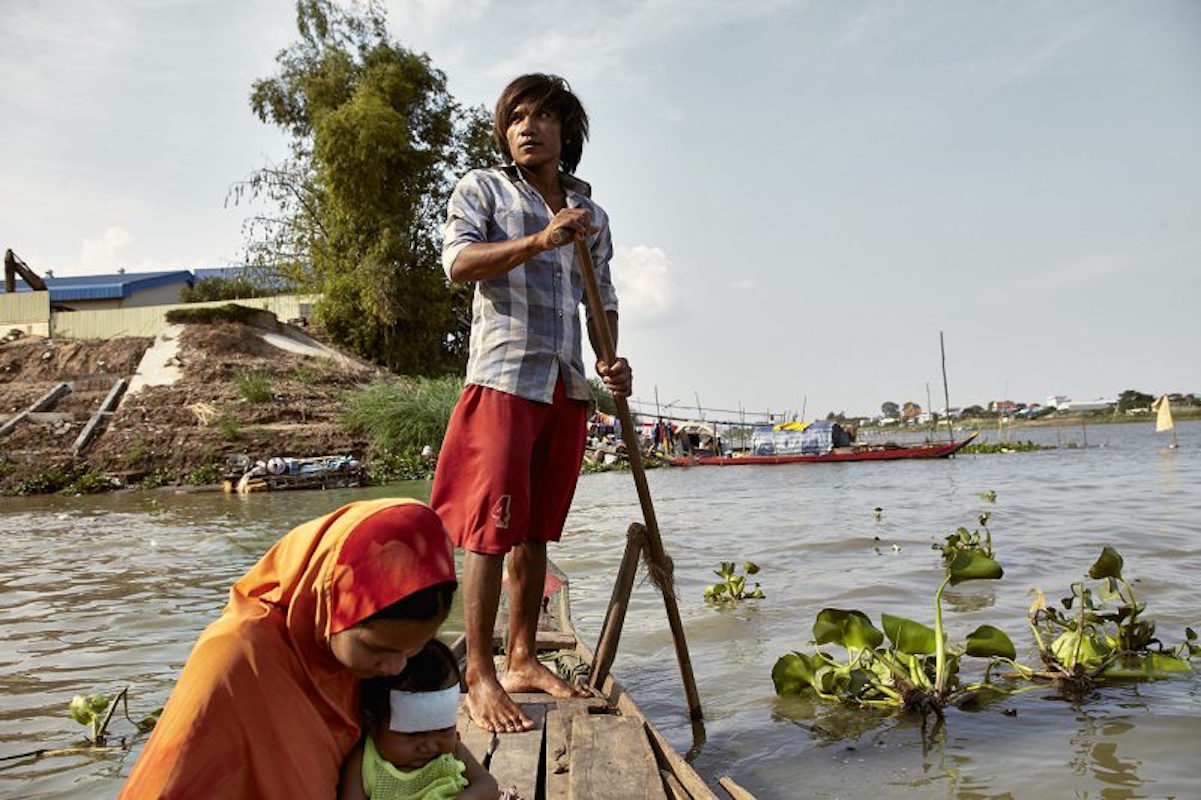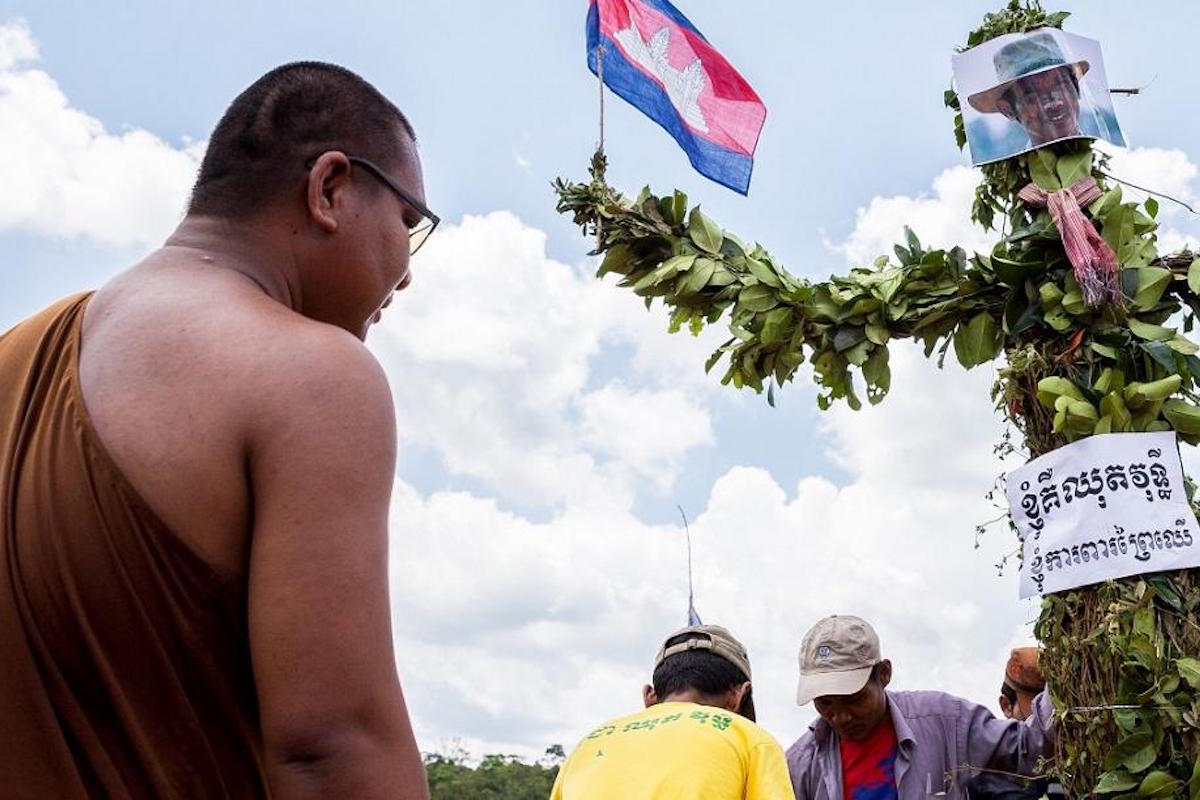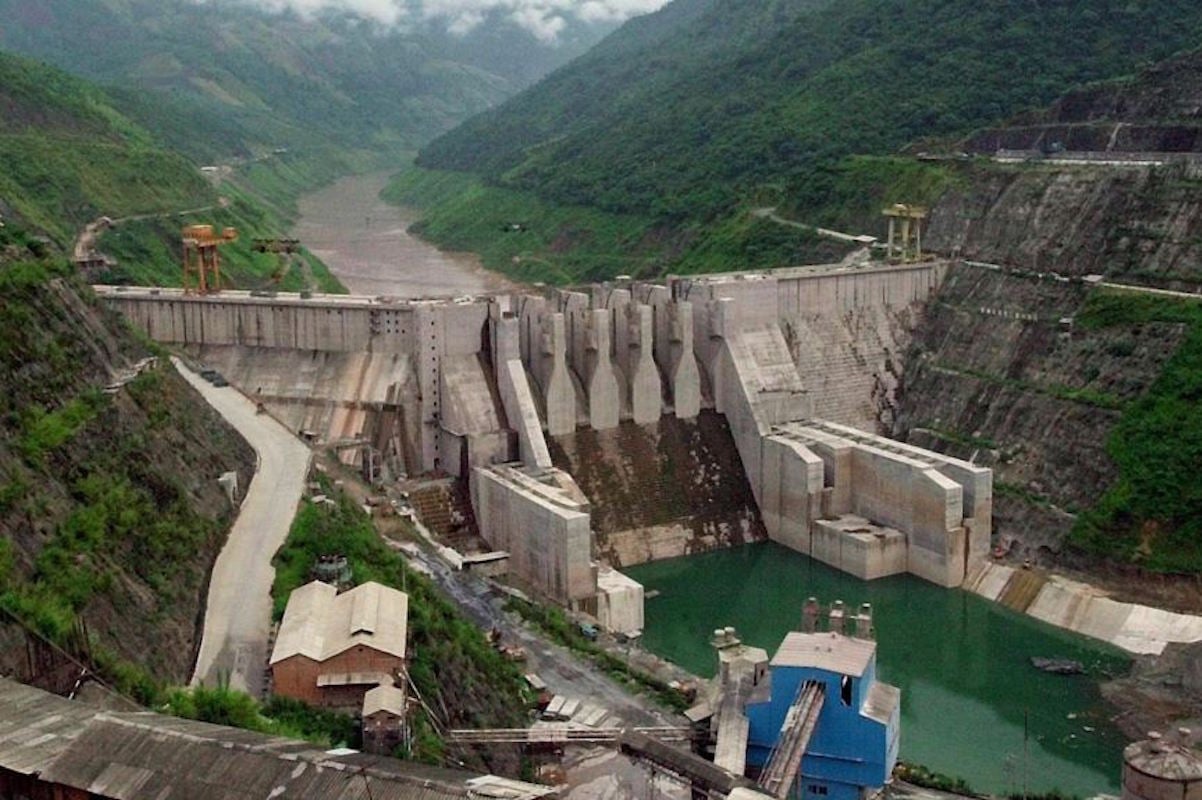Two weeks ago, shortly after it turned 2am, Sami’s boat rolled over on the waves of the Mekong river and tipped all of her possessions into the water—including Lydie, her newborn daughter. ‘Just like that, she was gone,’ the 16-year-old remembers.
Unable to sleep as the wind tore at the tarpaulin that served as a meagre shelter from the elements, Sami had spent the previous two hours sitting with her knees pulled against her stomach, wishing they were back on shore. While the storm raged around them her 25-year-old husband Luc, face fixed in a frown, was busy spreading his weight across the hand-carved boat’s wooden hull in an attempt to stop their little home from capsizing. All the while, their daughter had slept peacefully in her dark green cotton hammock. “I didn’t even have to rock her,” Sami says now. “The wind was strong enough to do that for me.” As the storm gathered force, she thought about taking Lydie into her arms for safety. “But I didn’t know whether it was better just to let her be. And when the boat fell, I couldn’t grab her in time. Suddenly I was just under the water, and everything was cold and black.”

Cambodia – 30/01/18 – Phnom Penh. Even if Samy and Luc live and keep all their belongings on their boat, they dock on the ground for safety and practical reasons. (PHOTO: Francesco Brembati. Via Global Voices)
Luc reached Lydie first. Diving deeper under the water, he pushed the rapidly sinking pots and pans and clothes out of the way to disentangle his daughter from the swathes of material that kept her in place. When the six-week-old began screaming after reaching the surface, Sami burst into tears. “I thought she was dead. Babies die all the time here. You never know if you’re going to get to keep yours for life or just for a little while.”
Sami and Luc both grew up on the water. As members of the Cham community – a minority group of approximately 288,000 Cambodian Muslims who largely live along the Mekong river and around the edges of the Tonle Sap lake in the Kompong Chhnang and Kompong Cham provinces, their families can trace an oral history of fishing and seafaring that dates back 4000 years—a history that includes migrating across South East Asia and surviving the Khmer Rouge genocide of 1975-1979.
But Sami and Luc are also part of a new generation of teenage parents whose numbers have almost doubled in Cambodia since 2010, even though marriage is illegal for those under 18. Nevertheless, girls of 15-17 years fall for their boat-dwelling neighbours, and a lack of sex education—or any kind of education, for that matter—means they quickly, if perhaps unintentionally, start families shortly after. This lack of life experience combined with a hard-to-shake-off cultural inheritance has given rise to a new crisis of survival.
While on the surface parents may be getting younger, little has changed in the way the community lives. Every morning as the sun rises families stir from their sleeping quarters on board their small wooden boats, and together they head out into deeper waters to hunt slippery mud eels and small silver carp known as “trey riel”. Teenage mothers stand tall on the bows, loosely-wound hijabs protecting their necks from the sun, as their husbands heave hand-woven nets into the water and wait for them to swell.
On a good day, the stores below deck will swarm with fresh catch, and families head straight to Prev Pnov fish market, 12 kilometres north of Phnom Penh where a kilo of fish commands up to 6000 riel, or $1.50. Fish soup and rice is served up for breakfast and lunch. Fried fish and rice is passed around for dinner.
But good days are getting harder to come by, and to this generation they also seem less and less worth waiting for.
In recent years, new technologies and illegal fishing methods—such as using batteries to electrocute whole schools of fish—have begun depleting local fisheries. The government’s target of producing 1.2 million tonnes of fish by 2019, to reduce imports from neighbouring countries such as Vietnam, is encouraging the establishment of industrialized fish farms. Both developments are now forcing the Cham families to drive their boats more than three hours upstream to net a decent catch. When they arrive with their buckets of carp at Prek Pnov they find prices dropping, making it harder than ever to make a profit. And as luxury hotel development spreads along the banks of the Tonle Sap river, there’s even more pressure on the Cham community to disperse its camps and stay moored in the middle of the river through the night, increasing the risk of capsizing and drowning.

Cambodia – 15/02/18 – Phnom Penh. In the islamic fishing community on the river of the Mekong in Phnom Penh not all the kids immediately learn how to swim, even if they live on the water. For this reason there is often the chance of drowning. However, while boys learn earlier, girls often start learning just when they leave the family to get married. Some of the older women in the community still don’t know how to swim. (PHOTO: Francesco Brembati. Via Global Voices)
So for today’s young adolescent parents with children to feed, life on the water is beginning to lose some of its appeal. “My daughter Lyna cries all day because she’s hungry, and I have nothing to feed her with,” explains Ros Herny, 17, who only learned to swim two years ago despite living on board the boats since birth.
“When I was growing up, I would eat fish for breakfast, lunch and dinner, with a little rice to keep me full. But fish has become a luxury that we can’t afford to keep for ourselves anymore. So I feed Lyna rice with river water for breakfast, lunch and dinner instead, and she has no fish at all. She has no energy and is small for her age. It makes me wonder why we live like this at all.”
Her parents’ generation had it better off, Herny says. “My friends and I are starting our families now, but we don’t have the skills we need to compete with the big companies, so our children are the ones without anything to eat. Meanwhile, my parents only have to look after themselves. Sometimes they still have lots of fish.”
Dak Gneng, project manager of the Takmao branch of the local NGO Friends International, says he’s encountering increasing numbers of adolescent mothers from the Cham community who are unable to feed their children.
“When I talk to them, they all tell me is how dangerous it is to lead this life,” Gneng explains. “Their parents say ‘this is our culture, you must live along the river and respect the water’, but the youngest generation is the one faced with the prospect of feeding their families and competing with the big corporations. They are more and more unhappy here.”

Cambodia – 22/02/18 – Phnom Penh. As hotels such as the Sokha continue cropping up along the Tonle Sap riverside, there’s even more pressure on the community of Islamic fisherfolk to disperse its camps and stay moored in the middle of the river through the night; increasing the risk of capsizing and drowning. (PHOTO: Francesco Brembati. Via Global Voices)
Many young parents have already begun looking for work in other industries such as garment factories or market stalls. Some even consider begging along the riverside as a more viable alternative. (“I don’t like it, but it’s all I can do sometimes,” says Herny). Sami’s husband Luc recently found a job on a tourist boat, sailing up and down the river at sunset as visitors snap pictures of the silhouetted outline of the community he calls home. “He says he wants to save up enough money for us to rent an apartment in the city centre,” says Sami. “We don’t want our daughter to grow up feeling hungry or scared like us.”
But the same youthfulness that has breed dissatisfaction can also make leaving their community difficult, particularly when it comes to saying goodbye to parents. Hasanas Rong is 17 and is raising her two-month-old daughter Eyni alone since her husband left her to move into the city. “He said he didn’t want to be a fisherman anymore, because there aren’t any fish,” she explains. “We argued, because I didn’t feel ready to leave my family, and then he said he was going to divorce me.” She was three months pregnant at the time, and she hasn’t seen him since.

Cambodia – 04/02/18 – Phnom Penh. Hasanas Rong (17) with her daughter Eyni Not (2 months old). After being left by her husband while pregnant, Rong went back to live with her family as she has no job and no way to earn money. Rong and Eyni both suffer often from hunger, but it would even worse if her family couldn’t help them at all. (PHOTO: Francesco Brembati. Via Global Voices)
Her 34-year-old brother, Hole Son believes his sister should have left her relatives behind and followed her husband in return for a more stable income. “Rong is too young to have a child, but this is normal here,” he says. “Most girls are teenagers when they get pregnant for the first time. Now we have to support her, because she doesn’t have a job, and her daughter has nothing to eat. I often see Rong go without food for days at a time, just so she doesn’t have to deal with the shame of asking our mother and father for more help.”
Hole Son says that when fishing goes well he can still earn up to 60,000 riel ($15) in a single day, and will offer his sister help. “But when it goes badly, I earn nothing at all.” On those days, the older generation takes priority. “As a sign of respect, we feed our parents first—even if it means the young ones miss out,” he says.
Rong goes quiet when asked about her situation. “It’s just so bad for my baby,” she says eventually. “I can’t breastfeed her, because I don’t have enough milk, and she cries all day because she’s hungry. We are sat out under the sun all day, which I think makes us sick, too. Everything is very bad for us here. I am very scared for my baby.”
Sami agrees. “When I was a child, I was hungry too, but I was never as hungry as this. When I look at Lydie, I think ‘maybe you would be better off away from the water. Maybe the water is not our friend after all.”
Corinne Redfern is an award-winning freelance journalist whose work has appeared in the Telegraph, Guardia, Marie Claire, Stylist, Sunday Times and BBC. She is currently based in Cambodia. This article is part of the Crying Hunger Project, produced with support from the European Journalism Centre.





